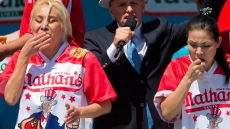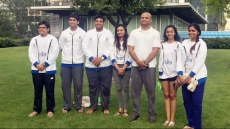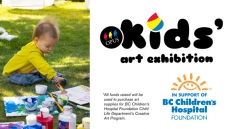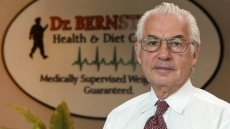TORONTO — Is it possible to ingest cocaine by kissing someone who has just snorted the powerful stimulant drug? Enough that its chemical signature would show up on an athlete's doping tests?
That's reportedly what happened to Canadian pole vaulter Shawn Barber, who tested positive for trace amounts of cocaine after winning the Canadian title in Edmonton in early July.
Despite the result, the 22-year-old was allowed to compete at the Rio Olympics after the Sport Dispute Resolution Centre of Canada (SDRCC) determined he had inadvertently absorbed the banned substance while kissing a woman he'd met for a sexual tryst the night before the national competition.
That raises the question of how someone could take in enough cocaine by locking lips that the drug's chemical clues would show up in their urine.
"There's a minimum amount you need to be exposed to," said Dr. David Juurlink, head of clinical pharmacology and toxicology at Sunnybrook Health Sciences Centre in Toronto. "It's very difficult to imagine a scenario in which the exchange of saliva through kissing transfers from one person to another a sufficient amount of cocaine to result in a positive urine test."
Signs of cocaine, an extremely addictive drug derived from South American-grown coca leaves, shows up in the urine as a metabolite after processing by the body.
"To detect a drug in urine, one has to be exposed to a sufficient amount of it, and it has to be excreted by the kidneys," Juurlink explained.
"I can't say it's impossible, but it sounds extraordinarily improbable to me."
However, in a media conference call with Barber, his lawyer said the amount of cocaine metabolite detected in the 2015 world champion's urine was "very small."
"Scientifically, the forensic toxicologist that looked at the case understood and it was proved scientifically that it was impossible to have taken this amount of cocaine intentionally," said Paul Greene.
"And in fact, Shawn took a hair sample test ... and voluntarily put himself forth and was completely open from the beginning," Greene said. "It was totally inadvertent ingestion ... and that's why the finding was of no fault or negligence."

Greene also raised the 2009 case of French tennis player Richard Gasquet. The then-23-year-old was cleared to resume playing following a 2½-month ban from the circuit after he convinced the International Tennis Federation's anti-doping tribunal that he had ingested cocaine while kissing a woman he had met in a nightclub.
Gasquet tested positive in a urine sample after he pulled out of the Sony Ericsson Open in Key Biscayne, Fla., with a shoulder injury.
The Frenchman had been facing a lengthy ban for the tennis courts, but the tribunal panel of three lawyers decided Gasquet had consumed no more than "a grain of salt" amount of cocaine, and a long ban would be an injustice in a case that was "unusual to the point of being probably unique."
Barber could also have been looking at a long absence from vaulting competition: the Canadian Centre for Ethics in Sport had proposed a four-year ban. The SDRCC decided not to suspend him but stripped the athlete of his 2016 national title.
While cocaine is not considered among the chemicals some athletes use to cheat their way to a medal, ingesting the drug in a sufficient amount before a competition could boost performance, although it would be readily detected in subsequent doping tests, said Juurlink.
"In theory, an exposure to cocaine could enhance one's focus or athleticism temporarily," he said.
"But casual encounters with trace amounts of cocaine would have no bearing on one's performance. If it was the case that this was somehow truly inadvertent and trace exposure, it's inconceivable that it influenced his performance."





